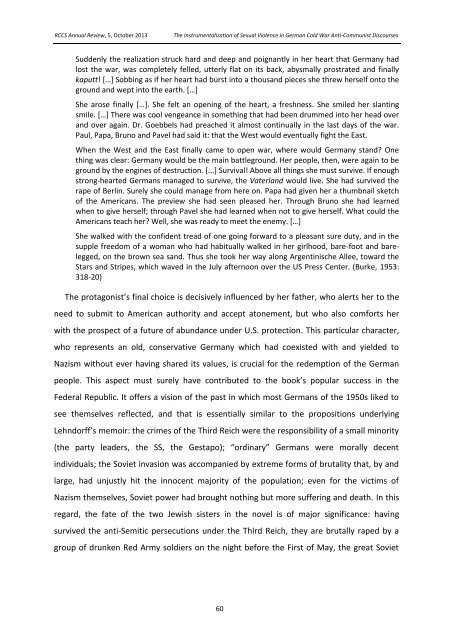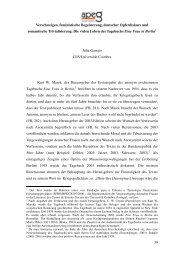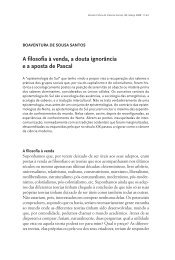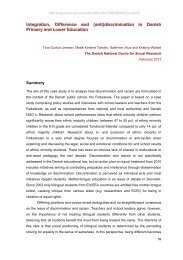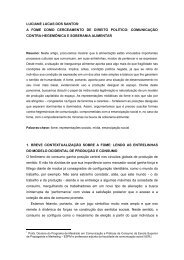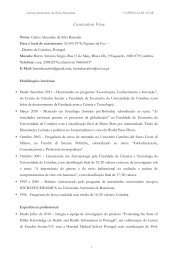The Instrumentalization of Sexual Violence in German Cold War Anti ...
The Instrumentalization of Sexual Violence in German Cold War Anti ...
The Instrumentalization of Sexual Violence in German Cold War Anti ...
Create successful ePaper yourself
Turn your PDF publications into a flip-book with our unique Google optimized e-Paper software.
RCCS Annual Review, 5, October 2013<br />
<strong>The</strong> <strong>Instrumentalization</strong> <strong>of</strong> <strong>Sexual</strong> <strong>Violence</strong> <strong>in</strong> <strong>German</strong> <strong>Cold</strong> <strong>War</strong> <strong>Anti</strong>-Communist Discourses<br />
Suddenly the realization struck hard and deep and poignantly <strong>in</strong> her heart that <strong>German</strong>y had<br />
lost the war, was completely felled, utterly flat on its back, abysmally prostrated and f<strong>in</strong>ally<br />
kaputt! […] Sobb<strong>in</strong>g as if her heart had burst <strong>in</strong>to a thousand pieces she threw herself onto the<br />
ground and wept <strong>in</strong>to the earth. […]<br />
She arose f<strong>in</strong>ally […]. She felt an open<strong>in</strong>g <strong>of</strong> the heart, a freshness. She smiled her slant<strong>in</strong>g<br />
smile. […] <strong>The</strong>re was cool vengeance <strong>in</strong> someth<strong>in</strong>g that had been drummed <strong>in</strong>to her head over<br />
and over aga<strong>in</strong>. Dr. Goebbels had preached it almost cont<strong>in</strong>ually <strong>in</strong> the last days <strong>of</strong> the war.<br />
Paul, Papa, Bruno and Pavel had said it: that the West would eventually fight the East.<br />
When the West and the East f<strong>in</strong>ally came to open war, where would <strong>German</strong>y stand? One<br />
th<strong>in</strong>g was clear: <strong>German</strong>y would be the ma<strong>in</strong> battleground. Her people, then, were aga<strong>in</strong> to be<br />
ground by the eng<strong>in</strong>es <strong>of</strong> destruction. [...] Survival! Above all th<strong>in</strong>gs she must survive. If enough<br />
strong-hearted <strong>German</strong>s managed to survive, the Vaterland would live. She had survived the<br />
rape <strong>of</strong> Berl<strong>in</strong>. Surely she could manage from here on. Papa had given her a thumbnail sketch<br />
<strong>of</strong> the Americans. <strong>The</strong> preview she had seen pleased her. Through Bruno she had learned<br />
when to give herself; through Pavel she had learned when not to give herself. What could the<br />
Americans teach her? Well, she was ready to meet the enemy. […]<br />
She walked with the confident tread <strong>of</strong> one go<strong>in</strong>g forward to a pleasant sure duty, and <strong>in</strong> the<br />
supple freedom <strong>of</strong> a woman who had habitually walked <strong>in</strong> her girlhood, bare-foot and barelegged,<br />
on the brown sea sand. Thus she took her way along Argent<strong>in</strong>ische Allee, toward the<br />
Stars and Stripes, which waved <strong>in</strong> the July afternoon over the US Press Center. (Burke, 1953:<br />
318-20)<br />
<strong>The</strong> protagonist’s f<strong>in</strong>al choice is decisively <strong>in</strong>fluenced by her father, who alerts her to the<br />
need to submit to American authority and accept atonement, but who also comforts her<br />
with the prospect <strong>of</strong> a future <strong>of</strong> abundance under U.S. protection. This particular character,<br />
who represents an old, conservative <strong>German</strong>y which had coexisted with and yielded to<br />
Nazism without ever hav<strong>in</strong>g shared its values, is crucial for the redemption <strong>of</strong> the <strong>German</strong><br />
people. This aspect must surely have contributed to the book’s popular success <strong>in</strong> the<br />
Federal Republic. It <strong>of</strong>fers a vision <strong>of</strong> the past <strong>in</strong> which most <strong>German</strong>s <strong>of</strong> the 1950s liked to<br />
see themselves reflected, and that is essentially similar to the propositions underly<strong>in</strong>g<br />
Lehndorff’s memoir: the crimes <strong>of</strong> the Third Reich were the responsibility <strong>of</strong> a small m<strong>in</strong>ority<br />
(the party leaders, the SS, the Gestapo); “ord<strong>in</strong>ary” <strong>German</strong>s were morally decent<br />
<strong>in</strong>dividuals; the Soviet <strong>in</strong>vasion was accompanied by extreme forms <strong>of</strong> brutality that, by and<br />
large, had unjustly hit the <strong>in</strong>nocent majority <strong>of</strong> the population; even for the victims <strong>of</strong><br />
Nazism themselves, Soviet power had brought noth<strong>in</strong>g but more suffer<strong>in</strong>g and death. In this<br />
regard, the fate <strong>of</strong> the two Jewish sisters <strong>in</strong> the novel is <strong>of</strong> major significance: hav<strong>in</strong>g<br />
survived the anti-Semitic persecutions under the Third Reich, they are brutally raped by a<br />
group <strong>of</strong> drunken Red Army soldiers on the night before the First <strong>of</strong> May, the great Soviet<br />
60


